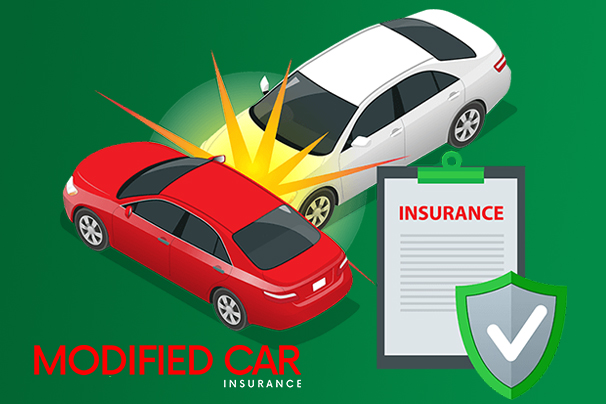There are numerous ways to modify a car, there isn’t any right choice for insurance on modified cars. Additionally, any changes to a car’s original part largely affect its worth. Moreover, you will probably have to include an endorsement in your insurance plan to protect modified parts. In such events, an evaluator might have to itemize and determine the worth of any custom components you wish to insure.

Furthermore, you and your insurance provider can establish an agreement upon policy value to ensure sufficient coverage for all the modified parts of your car to your regular coverage.
What is Modified Car Insurance?
Modified car insurance covers changes made to a vehicle and is important for car enthusiasts to protect their investments. These modifications, also known as customizations, include parts that are not originally included by the manufacturer, often referred to as aftermarket parts.
Additionally, some traditional insurance plans do not extend coverage to these modifications. However, you can make sure to get sufficient coverage for your whole vehicle, including aftermarket parts with a modified insurance policy.
Moreover, various insurers have various meaning modifications. Modified car insurance policies typically operate on a replacement-cost plan, meaning they cover the value of the modified parts installed on your vehicle.
Furthermore, you may need to collaborate with an appraiser to itemize and assess the value of your modified parts. It’s common for you and your insurer to reach an agreement on the vehicle’s overall value.
Although this particular type of insurance may involve higher premiums compared to standard policies, it generally offers superior coverage.
How Does It Work
Modified car insurance provides coverage for typical aspects like accidental damage and injuries to third parties. In addition, modified car insurance extends coverage to all additional parts and accessories installed on your vehicle.
For cars with significant value due to modifications, you may prefer a policy that offers special conditions in the event of a write-off. An agreed-value policy offers a fixed value for your vehicle, rather than relying on the average market value.
Furthermore, a salvage retention clause permits you to repurchase the remaining portions of your car and its components if it’s declared a total write-off.
Types of Car Modifications
Modifications have to do with modifying factory-installed parts. Drivers often install these parts to enhance the appearance or performance of their vehicles. These modifications may involve replacing components such as:
- Rims
- Bumpers
- Custom paint
- Running boards
- Truck bed liner
- Turbocharger
- Fuel system upgrade
- Suspension adjustments, either raising or lowering
Modifying a car’s parts significantly influences its value. Insurance companies may also take into account whether the parts were self-installed or professionally installed.
What Counts As A Car Modifications
A modification refers to any alteration made to your car that deviates from the manufacturer’s standard settings. These modifications typically fall into two categories such as performance or cosmetic.
Performance car modifications include changes such as adjusting suspension, replacing wheels, boosting horsepower, upgrading turbos, modifying engines, chip tuning and remaps, enhancing intake and exhaust systems, refining handling, lowering suspension, upgrading fuel systems, and modifying transmissions.
Cosmetic car modifications include additions like go-faster stripes, adjustments to body kits, installation of sunroofs, tinting windows, customized paintwork, and installation of speaker systems.
What Does Modified Car Insurance Cover?
When you modify your car to enhance its performance or appearance, you will likely require additional coverage or a distinct insurance policy for custom cars. The rationale is straightforward: modified vehicles often incorporate costly components and may necessitate specialized servicing.
Additionally, in the event of an accident, repair expenses tend to escalate. Moreover, such alterations typically elevate the insured car’s total value. However, including safety enhancements like anti-theft mechanisms could potentially lead to insurance discounts.
Benefits of Modified Car Insurance
If your vehicle has any modifications, it’s essential to have modified car insurance. This type of insurance policy can provide several advantages, including:
Coverage For Modified Parts
Traditional insurance policies typically exclude coverage for modified parts, leaving you with significant expenses in case of an accident or theft.
Protection For Your Policy
Failing to list modified parts in your policy could result in its invalidation. By purchasing a modified car insurance policy, you safeguard your coverage.
Moreover, it’s essential to have modified car insurance before driving a vehicle with modifications. In the event of an accident where you or another driver files a claim, the insurance company may reject it based on the modifications.
How Can I Save On Modified Car Insurance
Securing affordable modified car insurance may be challenging, but there are ways to lower your insurance premium regardless of your vehicle type. Reducing your mileage, parking your car off-road, and choosing for a higher excess, if financially viable can all contribute to cost savings.
Moreover, if you are curious about how a specific modification will impact your insurance, it’s advisable to consult your insurance provider. Additionally, if you’re set on modifying your car, our comparison service enables you to declare the alterations upfront.
Conclusion
When you modify your car with aftermarket parts, it’s essential to have coverage that extends beyond a standard car insurance policy.
